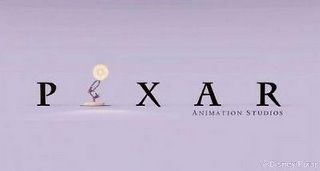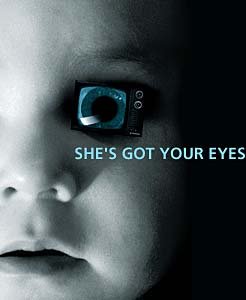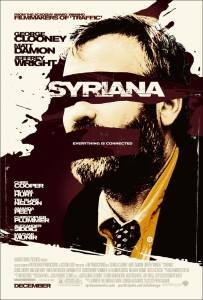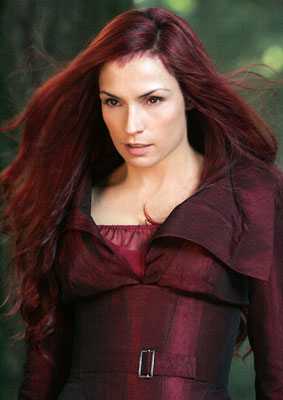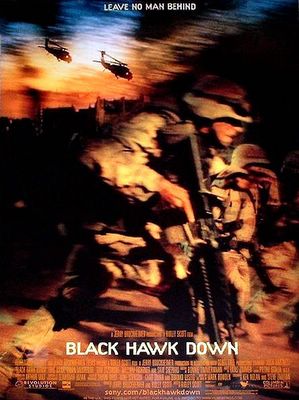 “Is Superman relevant? Look around. Aren’t we crying out for him?” --Bryan Singer, Director of
“Is Superman relevant? Look around. Aren’t we crying out for him?” --Bryan Singer, Director of Superman Returns
Today, the $365 million dollar (get your mind around that obscene number!)
Superman Returns flies into movie theaters. It already has generally stellar critical buzz and is the latest in a long laundry list of superhero movies that Hollywood has been gleefully churning out of its dream machine in recent years.
While stories with larger-than-life heroes and villains, the opportunity for masturbatory special effects, and a built-in teen-age boy fan base may try to explain Hollywood's fascination with the superhero genre, it is, I think, more complicated and mature than that simplistic break-down makes it appear.
Just why are there so many superhero movies out there? Why are so many more planned? What makes this kid’s genre--from all appearances--so important to all of us?
But first, what exactly is a superhero?
Perhaps unsurprisingly, the creation of “super” heroes is nothing new. Those elements that make up the stew of modern supernatural heroes are gleaned from the rich tradition of hero myths that date back to the beginning of civilization. In fact, the actions and exploits of many of these heroes could be classified as "super." It’s a familiar, archetypical story: a harmonious paradise is threatened by evil and when the normal institutions prove unable to contend with the threat, a selfless hero emerges, and at tremendous personal sacrifice and with a healthy dose of destiny, wins a decisive victory that restores the community to its original, blissful condition before receding into obscurity.
Sound familiar?
Though there are hundreds of caped crusaders darting in and out of comic books and movie screens, remarkably, most all superheroes possess similar qualities. In general, they possess extraordinary abilities, usually in the form of special powers, though sometimes merely the mastery of relevant skills or weaponry that make them appear supernatural. They possess a strong moral code, a deep motivation for responsibility or justice and a willingness to risk their own lives for the safety of others. This is usually done without expectation of reward. Indeed, most superheroes’ identities are closely guarded secrets. Though most superheroes are considerably patriotic, they are ultimately above the law and will, whenever necessary, lay the needs of the state aside if it conflicts with the greater mission of enforcing justice. They are noted for their feats of courage and nobility.
The superhero was born in 1938--at least our understanding of the superhero. With the publication of Action Comics #1,
Superman was introduced to the world and from his moniker, all future superheroes were so named.
Superman arrived on the scene at a time of tremendous tumult in America. The country was still reeling from the horrors of World War One. Scientific and psychological breakthroughs were commonplace. Everything from the car to the camera to the motion picture were being invented right and left. The United States suddenly found itself as a central economic and military power.
It was an era of great change. It was an era of great unease. It was an era of great promise.
The dawn of the 20th century was a time ripe for "super" heroes. And why not? America was becoming a "super" nation, composed of extraordinary individuals who truly believed in their ability to achieve the impossible. Cultures choose heroes as an indication of their national character and America created its heroes in ways that personified how Americans wished to see themselves--vibrant, strong, youthful, morally upright. Superheroes portray normal people on the outside, but have an untapped superpower on the inside. Their very existence implies that every one of us has a hidden power, ready to come out when it is called on or needed most.
Why superheroes? Because America needed them and was ready for them.
Superheroes were a way for Americans to explore their collective psyche, to confront issues of power, growth, hope and despair in a way that bypassed reality and set the stage on the far larger arena of mythology. These modern day passion plays allowed Americans to plumb their hearts and minds without the constraints of practicality or pragmatism.
It is often difficult to nail down exactly what defines a superhero from decade to decade because his or her make-up is an abstract and nebulous concept. Just as America is in a state of change, so too does the superhero adapt to fit the times into which he or she is introduced. As the country evolves, so do our icons.
And now, here we are, having just vaulted into a new century and millennium. Change, even in the best of times, is threatening. The millennial change did not occur without its fair share of apocalyptic and "end times" theories--theories that, for some, blossomed into fruition when terrorists flew jetliners into the New York City and Washington D.C. skylines.
(I remember that the first
Spider-man teaser had our hero wrapping up some up-to-no-gooders in a web between the span of the World Trade Center towers. The teaser was pulled immediately following their destruction. Shame really. I thought it was a perfect metaphor made all the more moving by our national loss.)
And now, just a few years removed from that terrifying day, the country finds itself bogged down in a foreign land, drowning in a war it is no closer to understanding today than it did the day the first bombs began to fall. We are in a state of fragmentation, suddenly unsure of our place on the global, let alone national, stage. The economy is sputtering. We are in the midst of a massive energy crisis. The threat of terrorism is everywhere. Pandemics breath down our necks.
It is an era of great change. It is an era of great unease. It is an era of great promise.
How do we cope?
Well, many ways of course. One of them being our need to fall back, all the more, on our hero myths. We take all our fears and night terrors and discomfort and we mold them into the shape of Lex Luther or The Riddler or the Green Goblin. Then we pour our hopes and dreams and sense of identity into our “super” selves, our Christ-figures and our saviors and let our altar egos duke it out. From the chaotic conditions of our human experience, we attempt to restore a sense of order.
Just look at the movieplexes around you. We’re currently buried beneath superhero films, with many more in various states of pre-production.
Just as America used superheroes in the past to struggle through its hopes and fears, so too will it continue to use these mythological figures as vanguards as we progress into the future. They will be shaped by our ideals, intelligence, and culture. Ironically, as we create our heroes, we are also creating our history. America of the future will know more about the America of the present because of these creations. They will be like like puzzles that reveal our collective angst and ambitions.
Postscript: As a nice aside, the first teaser trailer for
Spider-Man III is available
here. If you still haven't watched a trailer for
Superman Returns, you can do so
here.






